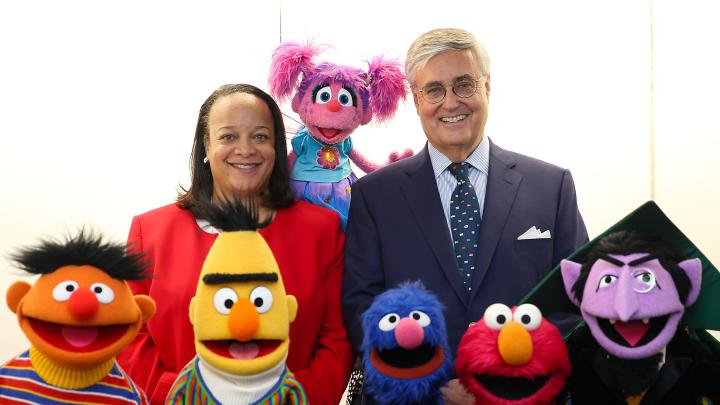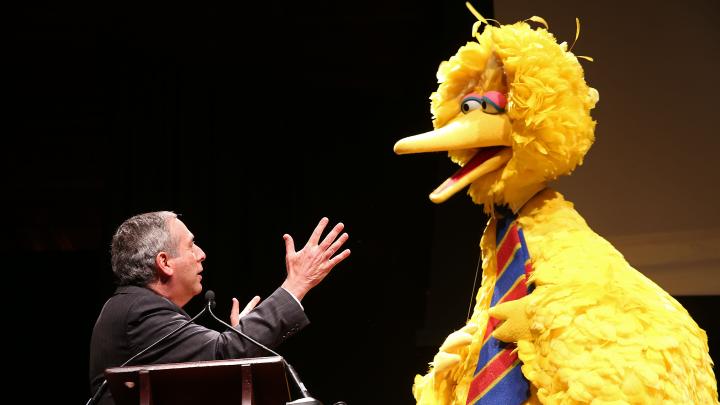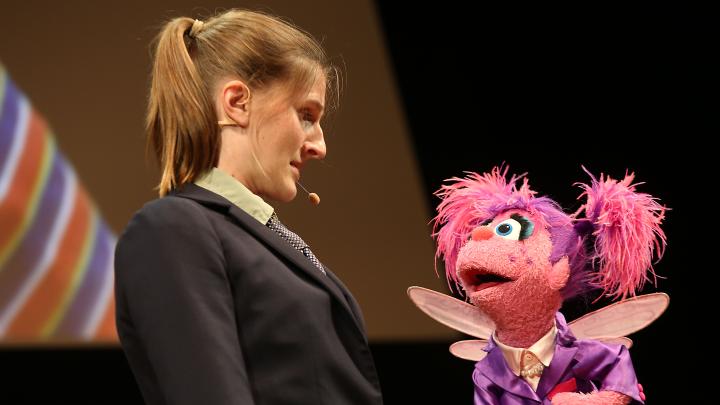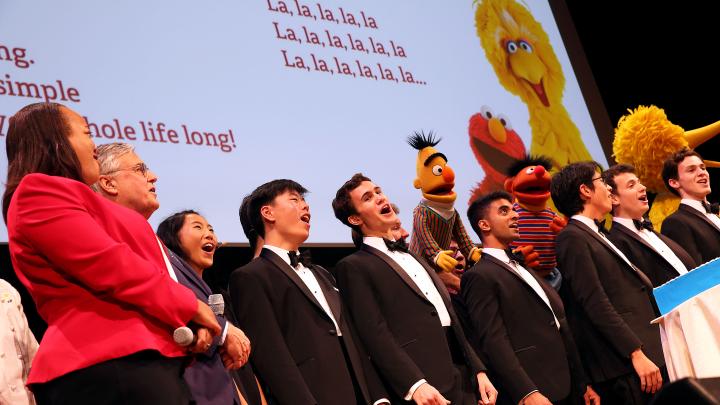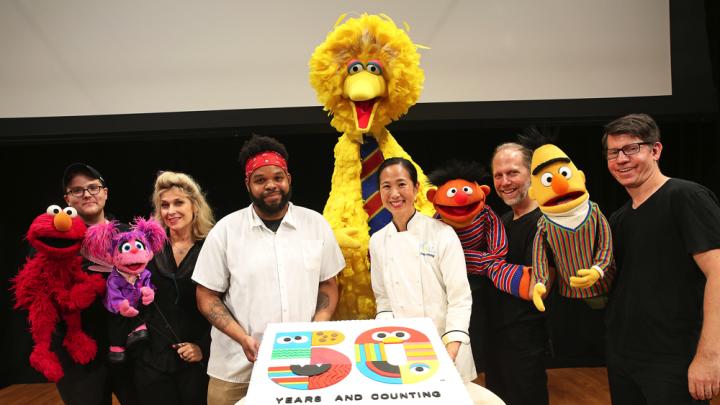The speeches were nice, but it was the Muppets everybody had come to see. That’s why Sanders Theatre was packed to the roof Wednesday evening with excited listeners—all adults now, who kept breaking into wild cheers and wide grins at the sight of Elmo or Big Bird or Bert and Ernie, and whose childhood memories, as the night wore on, sometimes seemed to catch in their throats.
The Sesame Street characters were in Cambridge to celebrate the show’s fiftieth anniversary and commemorate the partnership with Harvard that helped bring it into being. In the late 1960s, Sesame Street co-founders Lloyd Morrisett and Joan Ganz Cooney, Ar.D. ’75, approached the University with the germ of an idea: an educational television show aimed at preschoolers. A group of about a dozen professors from the Graduate School of Education (HGSE), led by the late Gerald Lesser, a developmental psychologist, spent two years working with the show’s creators and filmmakers to formulate a curriculum based on research into how children learn. Sesame Street was the first program of its kind to do so, and the creators also drew on the techniques of commercial television to develop scripts that would entertain and teach at the same time.
It was a revolutionary undertaking. In the years leading up to Sesame Street’s debut, “the world was just starting to pay attention to our youngest learners,” HGSE dean Bridget Terry Long told the audience; researchers were beginning to understand the critical importance of early education in shaping children’s whole lives. “Using modeling, repetition, and humor, Sesame Street helped children with not only their cognitive skills, but also their social and emotional development,” said Long, who remembers watching the show as a child herself (“It’s the reason I can count to 10 in Spanish”). “Sesame Street taught us to have courage, to reach out to people—or monsters—who might be different from us, and to have compassion for them.”
“We like to call Sesame an experiment that worked,” said Jeffrey Dunn ’77, M.B.A. ’81, president and CEO of Sesame Workshop, the nonprofit organization responsible for the show. Five decades after it first aired—on November 10, 1969—Sesame Street has won 193 Emmys and three Peabody Awards. “Most moving to us,” said Dunn, “The Hollywood Reporter called it ‘the most impactful show in the history of television.’” It is produced in 70 different languages and there are more than 150 co-productions around the world. One speaker, Shanna Kohn, Ed.M. ’14, a senior education manager at Sesame Workshop, explained that she was part of a team working on an Arabic-language version of the show meant for Syrian refugees. It “focuses specifically on social emotional learning,” she said, “which is really important for children who’ve experienced trauma.”
Noting the Sesame Street mission to “help kids grow smarter, stronger, and kinder,” Dunn offered thanks to the roster of Harvard faculty members and alumni who’d been instrumental across the decades—not just Lesser and his group of researchers, but also artists like the late Emmy-winning script-writer Thomas Whedon ’55 and Grammy-winning composer Joe Raposo ’58, who wrote many of the show’s classic songs, including “C is for Cookie,” “It’s Not Easy Being Green,” and the theme, “Sunny Days.” Emmy- and Grammy-winning composer and lyricist Chris Cerf ’63 stood and waved to cheers and applause when Dunn called out his name.
The CEO also recalled the contributions of Chester Pierce ’48, M.D. ’52, a Harvard Medical School psychiatrist who coined the term “microaggression” to describe subtle racial put-downs and became the first black student to play a major college football game at an all-white Southern university when the Crimson took on the University of Virginia in 1947. As an early Sesame Street consultant, Pierce’s major contribution, Dunn said, was in making sure the show was set in an integrated and multicultural neighborhood. “Chet understood and believed that television in 1969 was fairly racist because it didn’t have people of color in many programs,” Dunn explained. Pierce advocated for a multiethnic cast, with people of color as role models and authority figures. “It was his pushing that led to the environment that you saw on the show,” Dunn said. “He believed that reinforcing this message was every bit as important for kids as learning your alphabet and numbers.”
And finally, Dunn gave a nod to HGSE senior lecturer Joe Blatt, who continues the research collaboration with Sesame Street—the show’s producers even made a Muppet in his likeness—and teaches a class, “Informal Learning for Children,” known unofficially as “the Sesame Street course.” That course illustrates something Dean Long had talked about during an interview earlier in the day: the show as a source of experimentation and feedback for Harvard researchers as well as for the filmmakers. “It's not just us pushing out research,” she said. “It's not just, ‘Oh, we have this theory, now let's put it on TV,’ but really testing what resonates with children, what's really going to work. Fifty years ago, there was nothing like this. And so you have to keep a learning mindset.”
Wednesday night, the Muppets were the only proof needed of their own resonance. The crowd thrilled to every appearance—giggling, or teary-eyed, or both. Many, perhaps most, had grown up with the show: a 1996 survey, Long said, found that 95 percent of American preschoolers had watched the show by the time they were three years old. Even with the puppeteers in full view, crouching beneath the characters, their arms and mouths moving as the Muppets spoke and sang and danced, the illusion held—a decades-long spell still in force. Wearing professorial glasses and a mustard-colored cardigan, Grover introduced Long to the podium at the top of the performance. “Remind me, Grover, what classes do you teach here at Harvard?” Long asked. His elated answer: “Applied physics, and the history of fuzzy pink slippers!” Big Bird stepped on stage expecting to meet “my new friend, President Bac-Ca-Caw,” and discovering instead Harvard president Lawrence S. Bacow, who was neither a bird nor, as it turned out, a cow. Bacow declared the eight-foot-tall Muppet the official bird of Harvard and marveled at the deep connection that “young people continue to make with these extraordinary, gifted, and creative characters.” Elmo was the one who called Dunn to the stage, and before long, the Muppet was sweetly imploring the CEO to sing a song. When Dunn demurred, Elmo sympathized. “Mr. Jeff, Elmo understands that you are a little bit nervous to sing.” When Dunn finally acquiesced—“La, la, la, la , Elmo’s song”—the Muppet, in amazement, threw himself into Dunn’s arms.
The evening ended with a medley of Sesame Street songs from the a cappella Harvard Krokodiloes and the Muppets performing a skit with members of The Hasty Pudding, before Flour Bakery owner Joanne Chang ’91 presented Dunn, Long, and the Muppets with a giant, colorful, birthday cake emblazoned with “50 years and counting.”
Then Elmo led the whole ensemble—and the entire auditorium—in a rendition of Raposo’s “Sing”:
Sing a song
Make it simple
To last your whole life long
Don't worry that it's not good enough
For anyone else to hear
Sing
Sing a song
